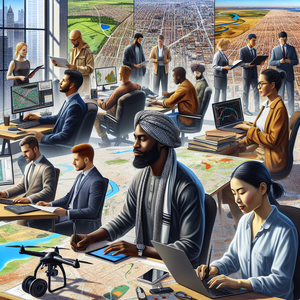
Navigating Opportunities in Mapping and Geographic Information Systems: 15 Thriving Careers
In an age where data drives decision-making, Mapping and Geographic Information Systems (GIS) have become essential. From urban development to environmental conservation, the use of geographic data is transforming industries and enhancing our daily lives. Take Google Maps, for instance; its real-time updates significantly improve navigation experiences. Similarly, tools like the FCC National Broadband Map highlight the critical role of mapping in evaluating service accessibility. This article dives into 15 dynamic careers within the mapping and GIS realm, ranging from technical positions such as GIS Analysts to creative roles like Cartographers. Each of these professions is instrumental in deepening our comprehension of the world and tackling pressing societal issues. We will explore job growth trends, salary expectations, and essential skills needed for success, while also sharing engaging insights and real-world experiences from professionals in the field.
Job Summaries:
GIS Analyst:
- GIS Analysts are at the forefront of spatial data analysis, collecting and interpreting geographic information to support decision-making in various sectors.
- They employ specialized software to create maps that visually distill complex datasets.
- A bachelor's degree in geography or environmental science is typically required, alongside expertise in GIS software like ArcGIS.
- With a significant increase in the demand for GIS Analysts anticipated, this role is a gateway to impactful work in data-driven environments.
Cartographer:
- Cartographers blend artistry with science to create maps that convey geographic information effectively.
- Their work involves researching data and designing visual representations using advanced software.
- A background in cartography, geography, or graphic design is often essential.
- As masters of visual communication, cartographers are crucial in making intricate datasets accessible and engaging.
- This profession is particularly appealing for those with a creative flair.
Remote Sensing Specialist:
- Remote Sensing Specialists utilize satellite and aerial imagery to track environmental changes.
- Their analytical skills are vital in fields like agriculture and urban planning.
- A degree in geography or environmental science is typically needed, along with proficiency in remote sensing software.
- This position is pivotal for organizations focused on understanding land use and managing natural resources effectively.
Urban Planner:
- Urban Planners develop strategies for land use in urban areas, ensuring sustainable development and resource efficiency.
- They analyze data on population density, zoning laws, and infrastructure needs.
- Usually, a master's degree in urban planning is required.
- Urban Planners often collaborate with GIS experts to visualize data, significantly impacting community development and urban environments.
Geospatial Data Scientist:
- Geospatial Data Scientists leverage big data to extract insights from geographic information.
- Proficient in programming languages like Python and R.
- They analyze trends that inform business strategies.
- Advanced education in data science and geography is often necessary.
- This role is increasingly crucial in sectors like retail and logistics, where geographic data can drive competitive advantages.
Survey Technician:
- Survey Technicians assist Surveyors in measuring and mapping land features.
- They ensure precise data collection for projects.
- They operate surveying instruments and compile detailed reports.
- A high school diploma is typically the minimum requirement.
- On-the-job training or an associate degree in surveying technology is preferred.
- This foundational role is indispensable across multiple industries.
GIS Developer:
- GIS Developers craft applications that enhance spatial data visualization and analysis.
- They employ programming skills to create tailored solutions for organizations.
- A degree in computer science or GIS is usually necessary, along with strong programming capabilities.
- This role is key for organizations aiming to improve their GIS functionalities and data accessibility.
Environmental Scientist:
- Environmental Scientists apply GIS technology to evaluate environmental data and develop sustainable practices.
- They conduct field studies and prepare reports that guide policy decisions.
- A background in environmental science, along with GIS experience, is essential in this role.
- This role is vital for organizations committed to sustainability.
Location Intelligence Analyst:
- Location Intelligence Analysts interpret spatial data to guide businesses in marketing, site selection, and operational efficiency.
- Requiring expertise in GIS tools and analysis, this role is increasingly significant as companies harness geographic data for strategic advantages.
Mapping Technician:
- Mapping Technicians support the creation and maintenance of maps and spatial data.
- They ensure data accuracy and assist in map production across various applications.
- An associate degree or certification in GIS or cartography is often required.
- This role is essential for accurate mapping, which is crucial for operational success.
Web Mapping Developer:
- Web Mapping Developers design interactive online maps that enhance user engagement.
- They create user-friendly interfaces and utilize mapping APIs to integrate geographic data into web applications.
- A strong background in web development and GIS is typically necessary.
- This role is vital for businesses aiming to offer interactive geographic solutions.
Spatial Data Engineer:
- Spatial Data Engineers oversee the architecture of spatial data systems.
- Ensuring efficient management of geographic information.
- A degree in computer science or geography is often required.
- Skills in database management are important.
- This foundational role supports organizations that rely on spatial data for informed decision-making.
Disaster Management Specialist:
- Disaster Management Specialists leverage mapping technologies to prepare for and respond to emergencies.
- They analyze geographic data to assess risks and formulate response strategies.
- A degree in emergency management or geography is typically necessary.
- This role is critical in enhancing community safety during crises.
Transportation Planner:
- Transportation Planners devise strategies to improve transportation systems.
- They use GIS tools to analyze traffic patterns and public transit needs.
- A degree in urban planning or civil engineering is usually required.
- This position is instrumental in enhancing mobility and reducing congestion.
Geospatial Analyst:
- Geospatial Analysts are specialists in processing geographic data to support various applications, from urban planning to environmental monitoring.
- They utilize GIS software for data visualization and modeling.
- A background in geography and experience in GIS are often essential, making this role important for organizations that depend on geographic insights.
The landscape of careers in mapping and Geographic Information Systems is not only diverse but also crucial in confronting the challenges of our times. With the job market expanding and the demand for skilled professionals increasing, now is an opportune moment to delve into this exciting field. Whether you are drawn to analytical, technical, or creative roles, the mapping and GIS sector presents pathways to make a meaningful impact while building a rewarding career. Embrace the opportunity to explore job listings and engage with professionals in the field to discover how you can contribute to shaping our world through geographic insights.
Explore More Jobs

